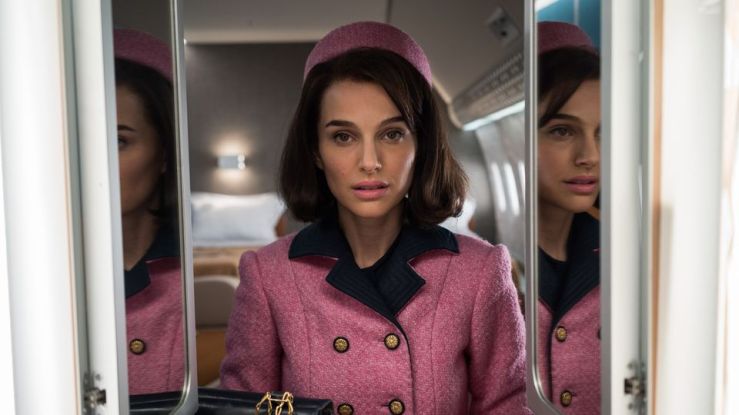
Pablo Larraín’s Jackie is both stunning and startling in its painful, yet illuminating take on the life and experiences of perhaps America’s most noteworthy First Lady, Jackie Kennedy, in the wake of the assassination of John F. Kennedy. There is so much to admire about the director’s careful assembly of elements that produce a film which captures both the era in which it is set as well as the fraught and macabre atmosphere which befell the Kennedy family and indeed, the world, following the horrific events of 22nd November 1963.
Most central to the film’s glory is Natalie Portman’s hugely captivating and rather pragmatic portrayal of Jackie. As pointed out by Mark Kermode in his review, Portman’s performance isn’t necessarily accessible or likeable for some viewers on first watch, potentially coming off as contrived or overly considered, particularly due to Jackie’s iconic voice and her demeanour when dealing with press in the wake of her husband’s murder. This, however, was exactly what drew me, and clearly many others, to the performance. Ultimately, as Kermode goes on to explain, Portman’s role consists of a performance of a performance, in the sense that Jackie adopts several different personas when battling against the uncertainty, unfairness and grief she is dealt. This is undoubtedly a standout role in Natalie Portman’s career, offering a challenge which is seemingly wholly different to anything she’s taken on in the past. Naturally, stepping into the shoes of someone who was not only real, and whose tale is steeped in history and speculation, but also such an iconic figure, would be demanding, and in my experience it was Portman who expertly shaped the film into what it was: an arresting and multi-layered exploration of a woman whose pain was felt by every single audience member.

Structurally, the film created a vivid sense of Jackie’s artifice, from the absurdity of her duties and exchanges immediately following Kennedy’s assassination, to her strained dealings with both the staff of Lyndon B. Johnson after succeeding Kennedy as president, and Bobby Kennedy (Peter Sarsgaard) as discussions take place about the safety of the family and conditions of the funeral. The decision to map between these events, leading up to the funeral and afterwards, creates a beautiful and painful tapestry of heartrending moments of bitterness, frustration and sadness which elevates the film above the mediocrity which often takes a hold of similar biopics of this kind.
One of the most poignant conversations between the pair, and indeed one of my favourite scenes from the film, occurs near its ending, in which Bobby Kennedy laments about what could’ve been, emphasising the tragedy and brutality with which his brother’s life and presidency was cut short. The film has enormous emotional resonance thanks to its exceptional performances, as well as the ethereal score added to proceedings by Mica Levi, whose most notable work is still perhaps her spine-chilling score for Jonathan Glazer’s Under The Skin. Her touch adds a certain gravity to the film, with the score she created for Jackie differing in tone from the eerie sci-fi qualities of Under The Skin, naturally, but still possessing the same haunting sound we have now come to expect from the composer. The score compliments the cinematography exquisitely, with the 1:1 aspect ratio and sumptuously grainy celluloid style lending itself to not only channelling the early 1960s, but also mimicking the visual style of televisions, through which many members of the public would have viewed Jackie and her family in light of the events surrounding them back in 1963. The camera fluctuates between still, poised, slow push-ins in the first half of the film, and more fluid, handheld movement as the film progresses, allowing us to become immersed in the growing maelstrom of confusion and chaos Jackie finds herself in.
I feel Jackie may end up being somewhat underrated, with some viewers perhaps overlooking the film’s marvels due to the unusual and initially perplexing style Natalie Portman adopts in her depiction of the First Lady. However, I firmly believe that every part of Jackie’s composition is well-thought out and essential in moulding one of the most infamous and endlessly-discussed political and cultural tragedies of the 20th century, into something tangible and poignant, a cinema experience which truly finds its way under your skin and exemplifies the beauty that can be achieved with nuanced filmmaking.


Portman is pretty good here. Nice review.
LikeLike
[…] Perhaps the most underrated film featured on this year’s list is Pablo Larraín’s hauntingly intoxicating portrayal of America’s most influential First Lady, Jackie Kennedy, whose quiet resilience is brought to the screen with unparalleled depth and elegance by Natalie Portman. With equally nuanced accompanying performances provided by the likes of Peter Sarsgaard as the enigmatic Bobby Kennedy, Billy Crudup as the reporter peeling back the layers of grief, fear and disillusionment Jackie finds herself in the grips of following her husband’s infamous assassination. Whilst Jackie didn’t make the waves that were perhaps expected of it, this is truly a testament to how encumbered with strong filmmaking the past year has been. Through its exquisite costume design and 35mm cinematography and Mica Levi’s bone-chilling score, Jackie manages to capture the spirit of both its namesake, and of a people, in one of America’s darkest moments. (You can read my full review here). […]
LikeLike